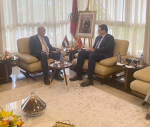You are here
A new mission for theWorld Bank
Aug 08,2015 - Last updated at Aug 08,2015
The Green Revolution is considered one of the great successes in the history of economic development.
In the 1960s and 1970s, the creation and adoption of high-yielding cereal varieties transformed the Indian economy and saved billions of people from starvation throughout much of the developing world.
But today, the future of the institution responsible for the Green Revolution — a consortium of 15 research centres around the world called the Consultative Group on International Agricultural Research (CGIAR) — is under threat.
The World Bank, one of its primary funders, is considering withdrawing its financial support.
On its own, this decision would be worrying enough. CGIAR’s mission is global food security, and basic agricultural research holds huge potential for providing economic returns to the world’s poor.
But what is even more worrying is the signal the World Bank is sending: that it will no longer support the underfunded global public goods that are crucial to preserving the social, economic, and political progress of the last century.
The proposed cuts at CGIAR are part of the World Bank’s effort to decrease its administrative budget by $400 million — a pledge made by the organisation’s president, Jim Yong Kim, in 2013.
The World Bank currently provides an annual grant of $50 million to the CGIAR; that would be slashed by $20 million, with the full amount possibly phased out entirely over a period of a few years.
On its own, the money involved would not be overly significant to either organisation. The figures being discussed are tiny compared to the $52 billion committed in 2013 by the World Bank’s donors to help fight global poverty and provide assistance to low-income countries.
For the CGIAR, the proposed cuts, though painful, would not be devastating; in 2013, the group spent $984 million to fund its activities.
Still, the World Bank — the preeminent global development institution — is essentially declaring that agricultural research is not a development priority.
Indeed, CGIAR’s funding is not the only funding that is at risk. The World Bank is also considering cutting its small but catalytic contributions to the Global Development Network, which funds researchers in developing countries.
Its support for the Extractive Industries Transparency Initiative, which promotes disclosure of deals concerning natural resources in the interest of reducing corruption, is also at risk, as is its funding for the Special Programme for Research and Training in Tropical Diseases.
These programmes, and others, are supported by the bank’s Development Grants Facility, which has been targeted as a possible source of administrative budget cuts.
The money provided by the World Bank to support the provision of development-related global public goods has never made up a large part of its spending.
The roughly $200 million a year that it spent on supporting CGIAR and other grantees pales in comparison to the $35 billion in loans that it provided in 2012. But the proposed cuts would gut an area of the bank’s activities that should be expanded, not reduced.
To be sure, at its inception the World Bank was not conceived as a provider of grants to institutions working on global public goods.
Its primary mission was — and still is — to provide governments with loans and technical assistance.
But it is worth noting that, relative to sovereign borrowing, private investment, and remittances by migrants, the World Bank’s relevance to developing countries’ finances has been severely diminished in the 21st century.
Because its loans or guarantees are bundled with expertise and advice, the World Bank still has a viable product. But, as I have argued previously, it should have another.
As the world’s premier and only fully global development institution, it is well placed — and indeed has the responsibility — to help sponsor, finance and set priorities in the management of global public goods.
It is time for one or more of the World Bank’s member governments to take up the cause.
The organisation’s quick response to the recent Ebola pandemic provides an impressive example of its ability to address global concerns.
Furthermore, this year, the international community will agree to the Sustainable Development Goals — targets that would be well served by investments in areas like agricultural research and development, efforts to optimise land and water use and forestry protection.
The United States, in close collaboration with Germany, the United Kingdom and China, should be able to provide a clear mandate for the World Bank in this regard.
The Bank’s 20th-century mission — to help countries finance their development — will remain vital for the foreseeable future.
But there is also room for the World Bank to adjust its focus for the 21st century, with an increased emphasis on one of the core prerequisites of development: the careful management and protection of global public goods.
The writer is the founding president of the Centre for Global Development. ©Project Syndicate, 2015. www.project-syndicate.org












